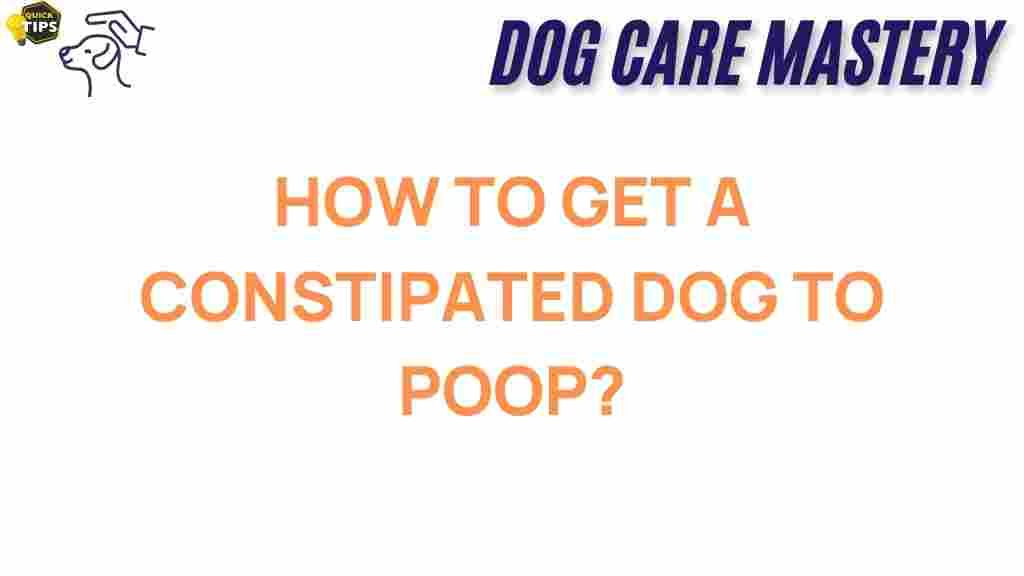Unlocking the Secrets: How to Help Your Constipated Dog
As a devoted dog owner, encountering the issue of a constipated dog can be quite distressing. Constipation not only affects your dog’s comfort but can also lead to more serious health issues if not addressed promptly. Understanding the causes, symptoms, and effective remedies can help you provide the necessary relief for your furry friend. In this comprehensive guide, we will delve into everything you need to know about how to help your constipated dog poop.
Understanding Constipation in Dogs
Before diving into solutions, it’s essential to understand what constitutes constipation in dogs. Constipation is defined as infrequent or difficult bowel movements. Just like humans, dogs can experience digestive issues that affect their ability to poop regularly. Here are some common signs of a constipated dog:
- Straining or difficulty while trying to defecate
- Less frequent bowel movements than usual
- Hard, dry stools
- Abdominal discomfort or bloating
- Loss of appetite
- Restlessness or excessive licking of the anal area
Common Causes of Constipation in Dogs
Understanding the root cause of your dog’s constipation is vital for effective treatment. Here are some of the most common causes:
- Dehydration: Inadequate water intake can lead to hard stools.
- Diet: Low-fiber diets or sudden changes in food can disrupt regular bowel movements.
- Lack of exercise: Sedentary dogs may experience slower digestion.
- Medical conditions: Health issues such as anal gland problems, tumors, or neurological disorders can lead to constipation.
- Medications: Some medications may have constipation as a side effect.
Step-by-Step Process to Help Your Constipated Dog Poop
If your dog is showing signs of constipation, follow these steps to help them find relief:
Step 1: Increase Water Intake
Dehydration is a significant contributor to constipation. Ensure your dog has access to fresh, clean water at all times. You can also:
- Add water or low-sodium chicken broth to your dog’s food.
- Encourage your dog to drink by providing ice cubes or water fountains.
Step 2: Adjust Their Diet
Diet plays a crucial role in digestive health. Consider the following dietary adjustments:
- Increase Fiber: Add high-fiber foods to your dog’s diet, such as:
- Pumpkin
- Sweet potatoes
- Green beans
- Brown rice
- Switch to a High-Quality Dog Food: Look for dog food that contains high levels of fiber and is designed to promote digestive health.
Step 3: Encourage Regular Exercise
Regular physical activity stimulates the digestive system. Engage your dog in daily walks, play sessions, or even swimming. Aim for at least 30 minutes of exercise each day to keep their bowels moving.
Step 4: Use Natural Remedies
In addition to dietary changes, consider incorporating natural remedies:
- Pumpkin Puree: Plain canned pumpkin (not the spiced pie filling) is high in fiber and can help regulate digestion. Start with 1-2 tablespoons per meal.
- Olive Oil or Coconut Oil: A small amount of these oils can help lubricate the intestines. Start with half a teaspoon for small dogs and 1 teaspoon for larger dogs.
Step 5: Monitor Their Progress
Keep an eye on your dog’s bowel movements. If they start to improve, continue with these methods. However, if your dog doesn’t show signs of improvement within 48 hours, it may be time to seek veterinary assistance.
Troubleshooting Tips for Constipated Dogs
It’s not uncommon for dog owners to face challenges while trying to relieve constipation. Here are some troubleshooting tips:
Tip 1: Consult Your Veterinarian
If your constipated dog shows severe symptoms such as vomiting, lethargy, or abdominal swelling, consult your veterinarian immediately. They may recommend diagnostic tests to rule out underlying conditions.
Tip 2: Check for Blockages
Constipation can sometimes be caused by blockages. Check for any foreign objects your dog may have ingested that could be causing an obstruction. This is especially important for dogs that are known to chew on non-food items.
Tip 3: Consider Medications
If dietary changes and natural remedies do not help, your veterinarian may prescribe laxatives or stool softeners specifically formulated for dogs. Never give your dog human medications without consulting a vet.
Tip 4: Regular Vet Check-ups
Regular veterinary check-ups can help catch any underlying health issues early. Make sure to keep your dog’s health in check to prevent future occurrences of constipation.
Conclusion
Helping your constipated dog poop can be achieved through a combination of dietary adjustments, increased hydration, and regular exercise. By understanding the causes and methods to alleviate constipation, you can ensure your furry friend remains comfortable and healthy. Remember, if your dog’s condition does not improve, don’t hesitate to consult your veterinarian for further guidance. Maintaining your dog’s digestive health is essential for their overall well-being, so take proactive steps to prevent constipation in the future.
For more information on dog care, visit this helpful resource.
If you’re looking for a comprehensive guide on dog nutrition, check out this informative site.
This article is in the category Health and created by dogcaremastery Team
